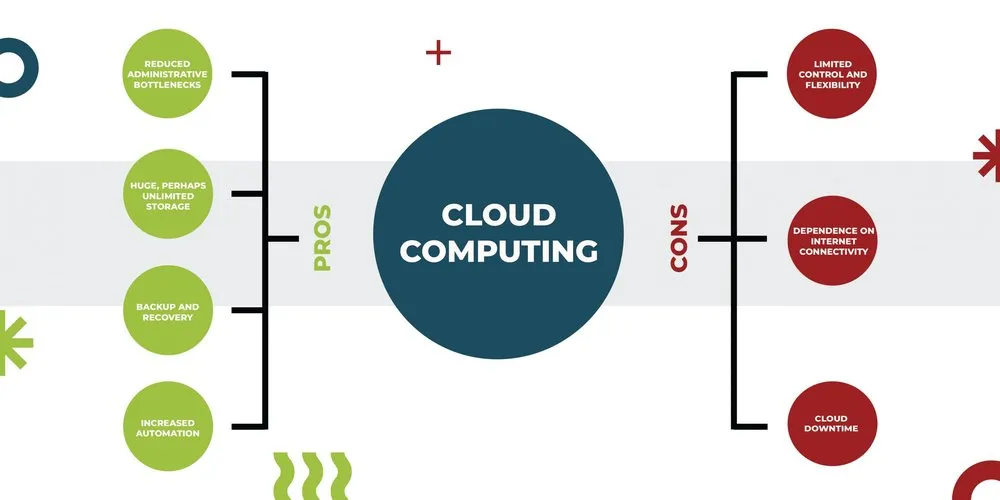Companies should examine their current IT infrastructure, consider their workload and application restrictions. Then they must determine if the cloud will address or eliminate their current challenges and limitations. So, in this blog, we'll lay out these cloud facts for you, and hopefully, we'll cover the most significant ones to answer your queries. The following are the benefits and drawbacks of using cloud computing:
What are the Benefits of Cloud Computing?
1. Reduced administrative bottlenecks:
Cloud computing makes management easier within a company. Whenever hardware is purchased or upgraded, the entire process involves several administrative duties that consume a significant amount of time. When it comes to cloud services, all you have to do is evaluate the finest cloud service providers and their plans, then choose the one that best meets your needs. The company's modest IT department, which it can afford to recruit, will focus only on end-user experience management. Because the majority of the other work, such as maintainability, is handled off-site, you can be assured that your IT infrastructure will be managed effectively at all times. Hence, in the cloud, your system maintenance duties are also removed. These are all left to the cloud service. Your sole criterion is that you have faith in your provider to complete the task on a consistent basis. Cloud resources are available from anywhere on the planet, at any time, on any device, and you have total control over them.
2. Huge, perhaps unlimited storage:
You'll have to acquire the physical infrastructure that works best for your firm if you don't use the cloud. However, you never know when you might need to enhance the storage capacity of your company. Cloud computing may free up space in your workplace for extra workstation or conveniences, while also removing the need to budget for future equipment upgrades. You won't have to worry about installing specialized breakers, high-voltage wiring, specific HVAC systems, or even backup power if you use the cloud. The cloud allows you to easily extend your storage as your demands grow. You can buy as much storage as you need, regardless of whose cloud you use, and it's significantly less expensive than having to buy new storage gear and software on a regular basis. Most cloud services provide you a large storage space where you may keep all of your important data. Even if you use it all, you can always upgrade to more secure cloud storage.
3. Backup and Recovery:
Data loss may have a severe impact on your organization. You might lose vital information, which could cost you a lot of money, waste your time, and harm your brand's reputation. Cloud backup is a service that backs up and stores data and apps on a business's servers on a distant server. In the case of a system malfunction, shutdown, or natural catastrophe, businesses choose to back up to the cloud to keep files and data accessible. You may have all of your data automatically backed up to the cloud on a routine basis. Moreover, the majority of cloud service providers are typically capable of handling data recovery. Because you save all of your data on the cloud, backing it up and recovering it is easier than storing it on a physical device. Consumers can do this on their own private or corporate servers, but cloud-service providers do it automatically and without the need for users to think about it. As a result, compared to other traditional data storage techniques, the backup and recovery procedure is more easier.
4. Increased Automation:
Software integration in the cloud is typically something that happens naturally. Also, if you employ cloud-based apps, they will be automatically updated without the users' input. You won't have to put in any extra work to personalize and integrate your apps according to your preferences. This is normally taken care of on its own. You may even handpick the services and software applications that you believe would work best for your company. Updating a system on a regular basis may be a difficult undertaking. Every individual's system must be updated by the IT department, which not only consumes time but also reduces productivity. Cloud computing goes a long way in streamlining these routine updates, allowing your staff to focus on the tasks that propel your company ahead.
What are the Disadvantages of Cloud Computing?
1. Limited Control and Flexibility:
Cloud computing makes management easier within a company. Whenever hardware is purchased or upgraded, the entire process involves several administrative duties that consume a significant amount of time. When it comes to cloud services, all you have to do is evaluate the finest cloud service providers and their plans, then choose the one that best meets your needs. The company's modest IT department, which it can afford to recruit, will focus only on end-user experience management. Because the majority of the other work, such as maintainability, is handled off-site, you can be assured that your IT infrastructure will be managed effectively at all times. Hence, in the cloud, your system maintenance duties are also removed. These are all left to the cloud service. Your sole criterion is that you have faith in your provider to complete the task on a consistent basis. Cloud resources are available from anywhere on the planet, at any time, on any device, and you have total control over them.
2. Dependence on Internet Connectivity:
Because cloud infrastructure is owned, managed, and regulated entirely by the service provider, cloud customers have less influence over the operation and execution of services within it. Customers maintain control over their apps, data, and services, but may not have the same amount of control over their backend infrastructure, such as firmware updates and management or server shell access. The end-user license agreement (EULA) and management policies of a cloud provider may place restrictions on what customers may do with their deployments. It specifies what restrictions the supplier can impose on your deployment use. Even if it doesn't enable you to change the architecture in any manner, all authorized cloud computing companies provide your company control over its apps and data.
3. Cloud Downtime:
One of the most common criticisms about cloud computing is that it causes downtime. Unfortunately, no company is exempt, particularly when vital business activities cannot afford to be disrupted. The vulnerability of public clouds is that everyone has access to the same server, which increases the danger of attack and slows down the server. Furthermore, because the cloud necessitates a high internet connection and adequate capacity, there is always the risk of a service interruption, which might result in company downtime. Today, no company can afford to lose money due to a disruption in vital business operations. You should prepare for cloud outages and business interruptions. Attempt to reduce the negative impact and provide the highest degree of service availability for your customers and employees.
Takeaway:
The benefits of putting data on the cloud are difficult to miss, but are the drawbacks expected to be dismissed as well? To be fair, companies must do a thorough analysis of their infrastructure and requirements. However, the advantages of cloud computing outnumber the downsides by a large margin. Cloud computing is a managed service that may help businesses of all sizes save time and money.










